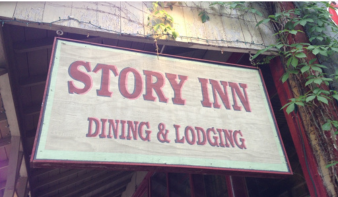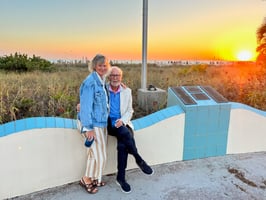Take couple who enjoys eating, traveling and sharing their stories, and it’s not long before a blog...
Healthcare en Francais
You know all those things you read about traveling abroad that you think, “Well that’s overkill on preparedness!”
The following is a classic tale from 2017 of “please learn from our mistakes.” And as I began the story with our children, “Lee is fine now, nothing to worry about.” But there were a few hours on on that Tuesday evening when even I couldn’t put a positive spin on it.
AKA "Are You Having a Stroke? Because this is a Bad Time for That"
Just so you know how we roll, I always carry -- even in my teeny-tiny super cute purse -- copies of our passports and our marriage certificate. I also carry an emergency stash of drugs that may come in handy if one of us is ill. In our minds, this was our “in an emergency we always have this” back up. And what we learned was, that’s really not enough.
We ventured to the center of our little French village on Tuesday evening for the weekly organic (“bio”) market after a pretty tiring day. We had been to the Cucuron market, to Bonnieux for (a too-rich) lunch and then to LaCoste. The latter includes a series of inclines to the top that are not for the slightly out of shape. Our traveling buddies were going to go spend the evening with their landlord, and it would have been a good opportunity for us to rest.
But we were determined to go to the Tuesday night market, because the week before it had been such fun. Besides, we needed some of those colossal heirloom tomatoes, and the market earlier in the day had fallen short in that area. We set off on foot, mindful to go around the town and entering closer to our destination instead of tackling the up-again-down-again bricked undulations of Lourmarin’s streets. Even so, I could tell Lee was not feeling so well.
We bought our tomatoes and “popped a squat” on a cement wall as no chairs were available, then I went off to purchase our 2-euro glasses of Rose for which the region is famous. I could tell Lee was “boarding the struggle bus,” and I snagged a chair so he’d be a bit more comfortable; after a few more minutes, I went to fetch some water from the little bar. When I returned, “the Hubs” was on the ground with people surrounding him; he contended he just got light headed and fell out of the chair. Back in the chair, we dipped into the emergency stash of meds and mulled over our evening plans. Maybe we would just go back to our house and make a little dinner.
Much like Nero fiddling while Rome burned, I decided to buy more produce while Lee rested. Into my bag went some lovely nectarines, pears and grapes. And more tomatoes … cherry ones that I could fix with pasta that would be fresh and delicious. Back at the wall, things were not getting better; pale and clammy, it was becoming apparent Lee was in trouble and my normal level headedness evaporated.
As he slumped over, I called for help. In English. In French. Perhaps in Swahili. I have no idea, but I was scared and knew that my limited French – which basically concentrated on telling people how many fill-in-the-blank I’d like – was not going to be very helpful. I frantically was trying to contact our English-speaking friends by text or by ‘WhatsApp,’ but nothing was working on my phone.
Regardless, a swarm of people did come to help. They brought blankets and pillows and made him comfortable. A sweet little second-year med student from England named Juliet and a retired French gynecologist (female, name unknown) were first on the scene. They monitored his vitals, and as he came to (after what seemed eternity but probably 5 minutes), Juliet held Lee’s hand and assured him he was okay. A wonderful woman named Jane appeared and helped me translate as the ambulance crew arrived; she offered to follow the ambulance to the hospital to help translate there as well.
Off we went to the nearest hospital in Pertuis – a 20-minute drive through the curvy hillside that by day provides amazing views and breathtaking foliage. From the back of an ambulance at night, it causes slight nausea. Belted into the jump seat (with my ridiculous bag of produce next to me), I felt helpless and scared. Lee was beginning to look less pale and was feeling a bit better, so my anxieties were moving away from immediate health concerns to logistics of what the night would hold.
Once at the hospital, it became increasingly apparent how unprepared we were for an emergency. Unlike everything you’re advised, we had no real list of medications. Lee had taken photos of his pill bottles prior to a doctor’s appointment in recent months, but … well, you know how many photos HE takes. Trying to find photos of random pill bottles was a 20-minute exercise in frustration for both of us. In the midst of that, an attending nurse asked, “How much does he weigh?” (pause) “In kilograms, please.” I couldn’t answer the first question, much less the second.
In the states, I rely on my phone for all of this information. However, I had chosen to just rely on whatever wifi I encountered during these two weeks as an attempt to unplug. Lee – who has an “unlocked phone” – had purchased an international SIM card upon our arrival but … he literally had 9% of his battery left. And I, who usually travel with my “Mofi” portable phone charger had chosen to “travel light” this particular evening. Besides, my phone had recharged in the afternoon, and I had 80% battery … a lot of good that did me. Also, we discovered that those portals where we keep our health and drug info block inquiries from foreign IP addresses. So, even with wifi (or “wee fee” as they say here), we were … out of luck. (That’s not really what we said, but you get the drift.)
They drew vials and vials of blood, and they did an EKG. They asked 1,000 questions of which we could answer about 25. But the physician and her staff seemed to gather enough to begin a diagnostic procedure. The doc called me into her little area with a computer and showed me her hunch — what we had experienced was probably a result of user error of a prescription. She literally used “Google translate” for my benefit … and I was grateful.
All this time, Jane had been in the waiting room, working on logistics of getting us home once Lee was released. At first, we thought a taxi would work, but then discovered it would probably have to come from Apt … and cost about 150 euro. No, cabs in this remote region of Provence do not take credit cards, and no, there is no Uber. Regardless, it was going to be at least two hours for the blood work to be finalized. We sent Jane home with the customary kiss on both cheeks for our new friend along with lifelong gratitude.
Finally, my brain kicked in, and I remembered I could buy Verizon International data by-the-day as needed for a per diem of $10. After restarting Lee’s phone and getting the number, I called our traveling buddies who were by now sitting at Café Gaby enjoying the evening … who assured us they’d come as quickly as their GPS could get them there.
Then we waited. Lee drifted in and out of sleep, and I assumed the “caregiving position” in a folding chair next to the bed. I thought of all the nights I had spent at our local hospital like this with my mom, and how different and yet similar those had been to this evening. The surroundings not as “well healed” but I felt no less well cared for. Our friends came. Lee’s test results came back, confirming the doctor’s initial diagnosis. We were told we could leave, but we would need to come back tomorrow when the office was open so we could pay.
Pay. Oh good Lord, how much was this going to be? In my head I started adding up … the ambulance, at least $1500 … Emergency room, EKG, blood work … We were probably going to leave France $20K lighter and have to deal with insurance when we got home.
A short and slightly fretful night passed. Much improved, we kept our reservation for lunch and on the way back, our band of Americanos stopped by Centre Hospitalier de Pertuis to settle up. We walked in. We sat down, handed our paperwork over and were given the grand total.
99,50 euro, $118.64 American dollars.
“Does that include the ambulance?” Lee queried (with the help of the translation app … sure, his battery is charged NOW).
“Oui!” she said. We counted out 100 euro, and she gave us our change. And off we went.
It’s a shame that they didn’t take a picture of our faces to post on Instagram … with the hashtag #RealAffordableHealthcare. We hadn’t cleared the door before our traveling friends said, “Well, THIS has to be a blog.” So, there you go. A little Google research turned up this information about the French healthcare system (feel free to click to learn more) that makes me think they’re onto something.
And hopefully you can learn from our mistakes. Next time you travel, revisit this blog … or just use the sidebar list. I hope you won’t ever need it. But if you’re reading “PostScript Living” and in our age range, in all likelihood it’s going to be “when” versus “if.”
The Essential Medical List for Travel
- Medication list, on paper, carried with you at all times. Name of medicine (if it’s a generic the coinciding med), dosage and usage.
- IF you have a special condition that requires TIMELY medication, have your doctor sign an order for such that you carry at all times (whether you're in OR out of the United States). If you have Parkinson's, do take time to review this and print out what you deem necessary.
- Most recent vitals – weight, height, ailments for which you are currently under a doctor’s care and what that treatment is
- Write down the words and phrases (in the language of the countries you are visiting) for these ailments as well as “I am American,” “I do not speak ____ very well,” “Help!” “Is anyone a doctor or nurse?” and “Please call an ambulance.”
- Even if one of you is the primary driver, the other should take a drive with the GPS just to get a comfort level.
- Even if one of you has the international phone, share all numbers you have gathered.
- Always carry a portable charger (make sure to keep it charged!) and cord for your phone.
- Do not discount the genuine goodness of people in this world. Our travels have always revealed the very best in humanity, and this experience was no different. For that – and a diagnosis Lee was oh, so happy to receive – we are very, very thankful.


